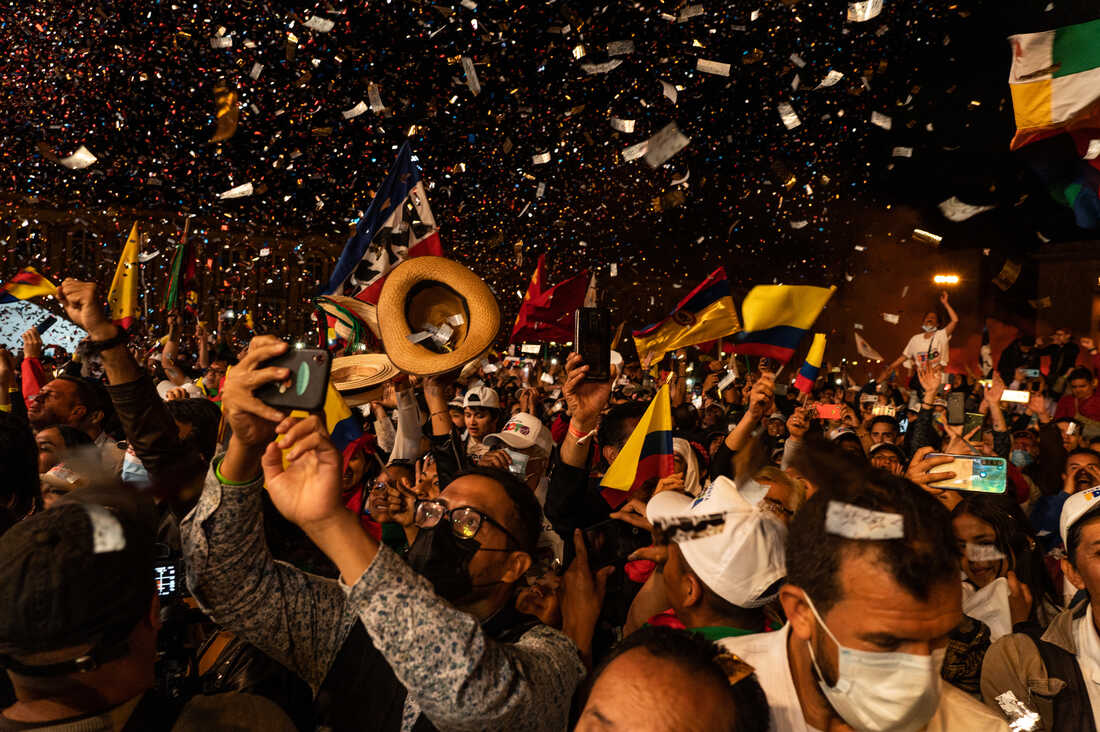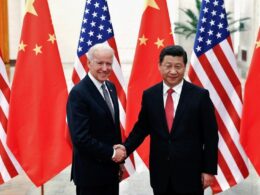By ISA Colombia (ISA–International Socialist Alternative, the international revolutionary socialist movement that the Socialist Party in Ireland is part of)
The results of the first round of the Colombian presidential elections reflect deep political polarization, a rejection of the political establishment and the masses yearning for fundamental change. In a traditional bastion of US imperialism, a stunning blow has been dealt to Uribismo, the far-right neoliberal politics (named after former president Alvaro Uribe) that have dominated the country for the last 20 years.
As expected, left candidate Gustavo Petro of El Pacto Histórico (Historic Pact) coalition came in first place with 40% of the vote — the largest vote ever for the left in Colombia. However, the former M-19 guerrilla’s path to victory appears more narrow and complicated than many had hoped or expected. Coming in second place and joining Petro in the second round is Rodolfo Hernandez, a 77 year old multi-millionaire, whose peculiar brand of right-populist politics saw him emerge from seemingly nowhere to capture 27% of the vote.
Hernandez overtook Federico ‘Fico’ Gutierrez, of the right-wing coalition Team Colombia, and the initial favorite to face off against Petro. Although Gutierrez tried to distance himself from Uribismo, most people saw through his shallow efforts to rebrand. Compared to the first round of the 2018 elections when current president Ivan Duque won with 39%, Gutierrez finished on 23.7%, a decline of over 2 million votes. Indeed this will be the first time since 2002 that neither Uribe himself nor his associates will feature in the second round.
Also notable is the spectacular collapse of the center. Sergio Fajardo, a ‘progressive’ neoliberal following in the footsteps of Tony Blair, went from finishing third in 2018 with 4,602,916 votes to fourth place with a mere 888,585 votes. Just like recent elections in France and Chile, Colombia follows international trends towards extreme polarization, with traditional capitalist parties and politicians being seriously undermined, and ‘anti-establishment’ figures battling it out.
The crisis of Colombian capitalism and El Paro Nacional
How are we to explain these results? Under Duque’s presidency, a government of the rich in its most naked form, inequality has deepened and we have seen a greater immiseratisation of the working masses. 40% of the population now live in poverty. Inflation has shot up to 9.2% with food prices increasing by a staggering 26% compared to this time last year. On top of that, political violence has intensified: in this year alone, 78 activists have been murdered bringing the number up to over 1,300 since the signing of the peace agreement with FARC in 2016.
These unending horrors of Colombian capitalism formed the inflammable material that exploded during last year’s Paro Nacional (National strike/stoppage). Initially called by trade unions to resist a government austerity tax reform, it quickly turned into an all out rebellion against the entire system of violence, corruption, and poverty. Virtually all sections of the working class and oppressed were widely represented and it shook the rotten regime to its foundations. In the city of Cali, the epicenter of the struggle, whole neighborhoods were placed under a form of democratic control by working class communities, holding meetings to coordinate actions and discuss next steps for the movement and even organizing local food distribution, security, medical care and libraries.
While the mass uprising forced the withdrawal of the bill and the resignation of its author, finance minister Alberto Carrasquilla, it was ultimately betrayed when the CNP (Comite Nacional del Paro, led by the national trade union bureaucracy) negotiated and ultimately conciliated with the government. Protests eventually fizzled out despite Duque remaining in power and the main social demands being left unresolved. Nevertheless a powerful mood of anti-uribismo gripped the masses and Duque now leaves office with a 73% disapproval rating.
Campaign of Gustavo Petro and Francia Marquez
In reality, these elections cannot be understood without taking into account the political earthquake that was El Paro Nacional, the reverberations of which can still be felt today. With the mass movement falling short of its full potential, working-class and young people have looked to the electoral plane as a route to achieving real social change and defeating Uribismo. The campaign of Petro and his running mate, Francia Marquez, a black environmental activist, has channeled much of the desire to break with the old regime and across the country, as hundreds of thousands have turned out to electrifying mass rallies and demos.
But does Petro have the program to really deliver? While it contains many positives like establishing a system of universal healthcare, a transition away from fossil fuel extraction and taxing the rich to fund social services, it ultimately remains within the confines of capitalism. Indeed, Petro himself has clarified that ‘Colombia doesn’t need socialism’, but rather the development of a ‘democratic capitalism’ in which the domestic market is developed and the feudal remnants of the Colombian economy are overcome.
Response of the ruling class
However, even many of Petro’s limited reforms would be resisted tooth and nail by the Colombian ruling class who are terrified of the social forces that stand behind Petro. Bloomberg reported that US investors were uneasy about the prospect that, as president, Petro might break with the economic model from which they have benefitted for so long, “a combination of fiscal discipline and a heavy dose of free markets.”
Feeling the same pressure local capitalists, the establishment and the media have engaged in a vicious campaign to undermine Petro with a constant barrage of right-wing, anti-communist propoganda peppered with sexist and racist rhetoric directed at Marquez. Even leading Generals in the Army have intervened to warn of the danger of a Petro presidency. As usual, there is constant reference to the failure of ‘socialism’ in neighboring Venezuela, the future awaiting Colombians, so say the right, should Petro come to power.
The path of moderation
Sadly, Petro has yielded to much of this pressure and in April went as far to sign a public statement promising that no expropriations would take place should he become president. This was part of a general trend towards moderation to calm the fears of imperialism and Colombian capitalists. Linked to that, has been the welcoming and promoted figures like Roy Barreras and Armando Benedetti, both of whom are former members of Union Party for the People (Partido de la U) established but later abandoned by Alvaro Uribe, and currently led by Dilian Francisa Toro, controversial politician from Valle del Cauca.
Petro has likewise made overtures to one of the traditional outfits of Colombian capitalism — the Liberal Party. In fact, prior to the internal primaries of the El Pacto Histórico, he considered offering them the position of vice president should they endorse and come on board with his political project. Those plans were disrupted by the phenomenal vote for Francia Marquez, who has a more organic connection to social movements and the combative sectors of the El Pacto Históricothan Petro himself, and made some criticisms of Petro from the Left. An expression of the frustration with Petro’s shift to the right, the near 1 million votes for Marquez also sent a clear message against the bureaucratic maneuvering of the leadership who sought to sideline the rank and file and led to Petro nominating her as his VP candidate.
The rise of Rodolfo Hernandez
The real shock of the election was the meteoric rise of Rodolfo Hernandez, a figure many are referring to as the ‘Colombian Trump.’ Hernandez proposes a mismatch of populist policies from promising to get rid of presidential planes to slashing state budgets to curb corruption. His self-financed campaign has been mainly conducted through social media (particularly tik-tok) and he has thus far refused to participate in debates.
In a much more distorted way, Hernandez expresses the rage towards the political establishment and the historic undermining of Uribismo. Although he took a significant chunk of the traditional right vote, by targeting political elites, as well as pledging to build affordable housing, he also won support amongst sections of workers and the poor. Ironically, Hernández has also attracted a great part of this elite he railed against during his campaign: they don’t consider him a serious menace to their privileges.
Nevertheless we should be clear about the danger that Hernandez represents. He has previously expressed his admiration for Adolf Hitler, and said that “ideally, women should devote themselves to childrearing.” This has provoked rage amongst Colombian feminist movement that has recently won important victories on abortion rights, but is also engaged in a struggle against the machismo that Hernandez relies upon and actively stokes.
As Hernandez refutes any connection with Uribismo and claims to be neither left nor right, an old saying comes to mind: “Tell me who your friends are and I will tell you who you are.” Within hours of the result, Gutierrez endorsed Hernandez and was soon followed by some of the most reactionary characters on Colombia’s right such as Maria Fernanda Cabal. The best part of the ruling class have already or will row in behind Hernandez, which should be further proof of the type of politics he represents. Hernandez is expected to take the vast majority of Gutierrez’ supporters and already polls are showing him ahead of Petro.
Petro’s New Strategy
Petro had banked on facing off against Gutierrez, a Uribista candidate that more obviously represents the rotten regime in Colombia and would be an easier opponent to defeat. As an “anti-establishment” figure, Hernandez complicates that strategy. He can definitely be exposed, but it will take a more combative approach from Petro to make clear that Hernandez is anti-worker, sexist, and firmly backed by the most loyal defenders of the current regime.
Petro does indeed seem to be changing strategy but unfortunately in the wrong direction: further to the right, one based on winning over the middle class and ‘center’ while trying to outflank Hernandez as a more “reliable” and “stable” candidate for Colombian capitalism. This will actually serve to strengthen Hernandez, pushing certain sections of workers and poor searching for an alternative closer to him. As a recent article in El Pais put it:
“While Petro has had to explain his ideas and make them more complex in order to scare away the fear caused in the establishment by the arrival to power of the left for the first time, Rodolfo Hernández has been able to construct simple metaphors that speak directly, and without intermediaries, to the heart of a lower and middle class, impoverished after the pandemic.”
Which way forward for El Pacto Historico?
In the wake of the elections, Petro called for supporters to go out and convince 2 million more people to vote for El Pacto Historico to ensure victory. However, we should be clear that this effort will be hampered by Petro’s limited program and his conciliatory approach with the establishment, both of which disarm him from really connecting with the needs and desires of the Colombian masses.
A victory is certainly possible but the only guarantee is building a mass campaign that represents a clear challenge to the system and argues for a bold programme for change to benefit workers and the oppressed, concretely linking itself to the struggles of the working class and oppressed, and fights to turn out some of the 45% of eligible voters who abstained in the first round. Local and regional branches of El Pacto Historico should hold mass assemblies that brings together trade unionists, young activists, feminists, social leaders, and indigenous groups to discuss a path forward.
We saw the latent power of the working class in last year’s Paro Nacional and we must reassert that it is only through struggle that real change can be won. Petro himself lagged behind the most conscious layers of the movement, and rather than putting forward the deepening and strengthening of popular organization, he sought to funnel the movement into electoral channels. For the last number of months his victory seemed all but certain, but now it has become clear that the demobilization of the Paro Nacional has actually weakened Petro’s position, giving an opening to the forces of reaction.
Even if Petro does win, implementing many aspects of his limited program and pushing for further change will require continued mobilization of the Colombian masses, the revitalization of organizations that emerged during the popular uprising of last year alongside the forging of new instruments of struggle, in which workers, young people, women and indigenous people are firmly in control.
ISA calls for a critical vote for Petro and Marquez to achieve a crucial step in strengthening the position of the working class and oppressed in the struggle against capitalism and imperialism, while fully aware that their current program will not point a way out of the overlapping crises facing the majority. To do so, and to combat the inevitable sabotage from the ruling class will require an open confrontation with capitalism, that is, arming ourselves with a socialist program and building a genuinely revolutionary force in Colombia and throughout the region, capable of harnessing the enormous power of the working class.












